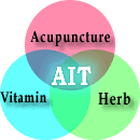Vitamins
Overview
VITAMINS: All natural vitamins are organic food substances found only
in living things, that is, plants and animals. With few exceptions
the body cannot manufacture or synthesize vitamins. They must be supplied
in the diet or in dietary supplements. Vitamins are essential to the
normal functioning of our bodies. They are necessary for our growth,
vitality, and general well-being.
HOW THEY WORK: A lot of people think vitamins can replace food. They
cannot. In fact, vitamins cannot be assimilated without ingesting
food. That is why we suggest taking them with a meal. Vitamins help
regulate metabolism, help convert fat and carbohydrates into energy,
and assist in forming bone and tissue.
Vitamin
A
IMPORTANCE: Necessary for growth & repair of body tissues; helps
maintain smooth, soft disease-free skin; helps protect the mucous
membranes of the mouth, nose , throat & lungs, thereby reducing
susceptibility to infections; protects against air pollutants; counteracts
night-blindness & weak eyesight; aids in bone and teeth formation.
Current medical research shows that foods rich in Beta Carotene will
help reduce the risk of lung cancer & certain oral cancers. Unlike
Vitamin A from fish liver oil, Beta Carotene is non-toxic.
DEFICIENCY
SYMPTOMS: Night blindness; increased susceptibility to infections;
rough, dry, scaly skin; loss of smell & appetite; frequent fatigue;
lack of tears in the eye; defective teeth & retarded growth of
the gums.
Vitamin
B1
IMPORTANCE: Plays a key role in the body's metabolic cycle for generating
energy; aids in the digestion of carbohydrates; essential for the
normal functioning of the nervous system, muscles & heart; stabilizes
the appetite; promotes growth & good muscle tone.
DEFICIENCY
SYMPTOMS: Loss of appetite ; weakness & feeling tired; paralysis
& nervous irritability; insomnia; loss of weight; vague aches
& pains; mental depression;constipation; heart & gastrointestinal
problems.
Vitamin
B2
IMPORTANCE: Necessary for carbohydrate, fat & protein metabolism;
aids in the formation of antibodies and red blood cells; maintains
cell respiration; necessary for the maintenance of good vision, skin,
nails & hair; alleviates eye fatigue; promotes general health.
DEFICIENCY
SYMPTOMS: Itching and burning eyes; cracks and sores in the mouth
& lips; bloodshot eyes; purplish tongue; dermatitis; retarded
growth; digestive disturbances; trembling; sluggishness; oily skin.
VITAMIN
D
IMPORTANCE: Improves absorption and utilization of Calcium and Phosphorous;
required for bone and teeth formation; maintains a stable nervous
system and normal heart action.
DEFICIENCY
SYMPTOMS: Rickets; tooth decay; softening of the bones and improper
healing of fractures; lack of vigor; muscular weakness; inadequate
absorption of calcium; retention of phosphorous in the kidneys.
VITAMIN
E
IMPORTANCE: Major anti-oxidant nutrient; retards cellular aging due
to oxidation; supplies oxygen to the blood which is then carried to
the heart and other organs; thus alleviating fatigue; aids in bringing
nourishment to cells; strengthens the capillary walls & prevents
the red blood cells from destructive poisons; prevents & dissolves
blood clots; has also been used by doctors in helping prevent sterility,
muscular dystrophy, calcium deposits in blood walls and heart conditions.
DEFICIENCY
SYMPTOMS: A rupture of red blood cells; loss of reproductive powers
and lack of sexual vitality; abnormal fat deposits in muscles, degenerative
changes in the heart and other muscles; dry skin.
VITAMIN
IMPORTANCE: Necessary for the synthesis & breakdown of amino acids,
the building blocks of protein; aids in fat and carbohydrate metabolism;
aids in the formation of antibodies; maintains the central nervous
system; aids in the removal of excess fluid in premenstrual women;
promotes healthy skin; reduces muscle spasms, leg cramps, hand numbness,
nausea & stiffness of hands; helps maintain a proper balance of
sodium & phosphorous in the body.
DEFICIENCY
SYMPTOMS: Nervousness, insomnia; skin eruptions; loss of muscular
control; anemia; mouth disorders; muscular weakness; dermatitis; arm
& leg cramps; loss of hair; slow learning; water retention.
VITAMIN
B-12
IMPORTANCE: Helps in the formation & regeneration of red blood
cells, thus helping prevent anemia; necessary for carbohydrate, fat
& protein metabolism; maintains a healthy nervous system; promotes
growth in children; increases energy; needed for Calcium absorption.
DEFICIENCY
SYMPTOMS: Pernicious anemia; poor appetite; growth failure in children;
tiredness; brain damage; nervousness; neuritis; degeneration of spinal
cord; depression; lack of balance.
Vitamin
B3 / NIACINAMIDE (Niacin)
IMPORTANCE: Improves circulation and reduces the cholesterol level
in the blood; maintains the nervous system; helps metabolize protein,
sugar & fat; reduces high blood pressure; increases energy through
proper utilization of food; prevents pellagra; helps maintain a healthy
skin, tongue & digestive system.
DEFICIENCY
SYMPTOMS: Pellagra, gastrointestinal disturbance; nervousness; headaches;
fatigue; mental depression; vague aches & pains; irritability,
loss of appetite; insomnia; skin disorders; muscular weakness, indigestion;
bad breath; canker sores.
VITAMIN
C (Ascorbic
Acid)
IMPORTANCE: Essential for healthy teeth, gums & bones; helps heal
wounds, scar tissue, & fractures; prevents scurvy; builds resistance
to infection; aids in the prevention & treatment of the common
cold; gives strength to blood vessels; aids in the absorption of iron;
required for the synthesis of collagen, the intercellular "cement"
which holds tissues together; one of the major antioxidant nutrients;
prevents the conversion of nitrates (from tobacco smoke, smog, bacon,
lunch meats, & some vegetables)
into cancer-causing substances.
Vitamin
C will decrease the risk of getting certain cancers by 75%.
DEFICIENCY
SYMPTOMS: Soft & bleeding gums, swollen or painful joints, slow-healing
wounds & fractures, bruising, nosebleeds, tooth decay, loss of
appetite, muscular weakness, skin hemorrhages, capillary weakness,
anemia; impared
Next

